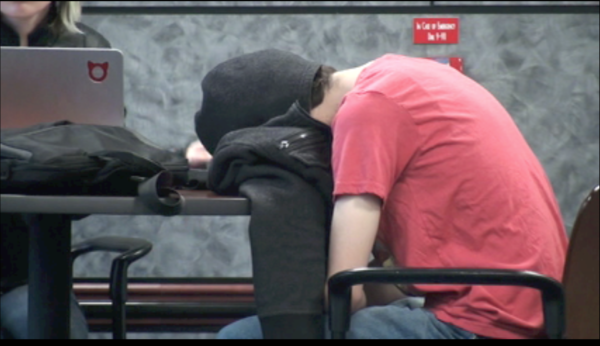
Eighty percent of college students are dangerously sleep-deprived, according to a Stanford University study.
Being sleep-deprived causes poor judgment, increases the risk of fatal accidents and decreases the body’s ability to concentrate.
“There are a lot of things linked to sleep deprivation and mental health,” said Dr. Elizabeth Rodriguez, a psychology professor.
The first sign, Rodriguez said, is depression, followed by anxiety.
“There are tons of sleep deprivation studies where they actually have a psychotic break showing signs a lot like schizophrenia, dissociative personality disorder,” she said.
Personality changes such as postpartum depression come from being sleep deprived and also can cause a small psychotic break.
“There are even studies that show you can live longer without water than you can without sleep,” Rodriguez said.
Getting enough sleep increases productivity and concentration.
People can’t be as effective as a student if they are sleep-deprived, Rodriguez said.
“Getting plenty of sleep strengthens our memory, helps us to increase our concentration, boosts our mood, moderates hunger and obesity, and it also helps to sort of fortify the immune system,” said Dr. Alan Kee, also a psychology professor.
Without sleep the body becomes fatigued, which can cause a person to be irritable.
“On a good night, I get seven hours of sleep, but five or six is pretty normal,” said Andrew Alexander, a general studies major. “If I don’t get at least that much sleep, I’m kind of grumpy in the morning, and it kind of throws my day off. But, I’m a college kid; you get used to it.”
Sleeping gives the body time to recoup and recover from the stress and wear of the day.
Studies show evidence that people who do not give their body time to sleep start to show signs of aging earlier than those who do sleep.
“People who get seven to eight hours of sleep a night tend to outlive those who are chronically sleep-deprived,” Kee said. “Sleep deprivation can make you fatter. It increases ghrelin, which is a hunger-arousing hormone, and decreases leptin, which is a hunger-suppressing hormone. It also increases cortisol, which is a stress hormone that stimulates the body to make fat.”
Kee tells students to have good sleep hygiene. Go to bed at the same time, get up at the same time each day, exercise, get regular exposure to outdoor light and keep the bedroom at a comfortable temperature.
Keeping the bedroom quiet and pets out of the bedroom also can help, Kee said, along with reducing the use of electronics before bed and taking medications only as directed.
Don’t exercise just before going to bed, don’t have important discussions just before bed and don’t play video games or watch TV right before bed, Kee said.
The psychology department has a sleep deprivation test that students can take to gauge their “sleep debt.”
If anyne wants to take the test, they can contact the psychology department for a copy.

Leave a Reply